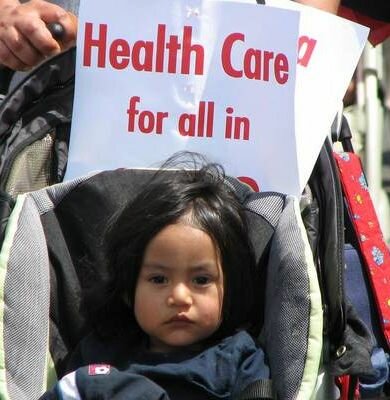Beyond health care reform: Write a check for Indian health
Health — By Mark Trahant on December 28, 2009 at 12:13I started my exploration of health care reform in July.
“The federal government accepts a double standard: Any discussion about rationing – or government care – is off the table unless you’re a member of an American Indian tribe or Alaskan Native community with a sort of pre-paid insurance program (many treaties, executive orders and laws were specific in making American Indian health care a United States’ obligation),” I wrote back then.
Six months later – or half way into this project – I am struck by how Indian Country is both a part of the health care debate and yet absent from its larger discussion.
We’re part of the conversation every time critics blast the Indian Health Service as a failure of government. We’re also included in the larger reform measure – the Indian Health Care Improvement Act – was added to the larger bill. That’s a good thing because this bill (unlike the original) has been awfully difficult to move through the Congress.

by Neil Parekh/SEIU Healthcare 775NW
But we’re absent from the conversation because neither the Congress nor the Executive Branch has articulated what lessons can be learned from the history and experience of the Indian health system as it applies to the larger issue of health reform. It’s particularly frustrating to watch the politicians who are quick to point out the weaknesses of that system even though they have never proposed adequate funding or the dreaded idea of rationing.
Consider how the money question goes beyond Indian Country: If the federal government can’t deliver on this one, relatively small promise, how is it going to make good on remaking one-sixth of the economy in a few thousand pages of legislation? Indeed, the history of federal appropriations – as well as the operation of a health care delivery system – ought to be applied to design of a larger health care system. That’s the ideal, anyway.
But there is another subject I want to write about during my next six months of my project: Ideas for strengthening the Indian health system regardless of the larger reform. Yes, more money is needed. And, perhaps, health care reform will deliver on at least some part of the federal government’s promise.
But that’s not enough. The Indian Health system must rapidly adapt to a new order of things. At the top of that list has to be a 21st century business model, one that recognizes the limitations of the federal government.
Sure, this will mean better third-party billing of private insurance plans, Medicaid and more. But even that will not be enough. There also ought to be a philanthropic component.
It’s time to invent a well-endowed national Indian health foundation, as well as regional and tribal foundations, to fund specific patient needs or programs that cannot secure government funding. The money could come from foundations, wealthy people, tribes, really, anyone who has compassion for people who need urgent health care they cannot afford. While the recession has taken its toll on the nonprofit sector, Americans remain committed to giving.
This is the flip side of rationing; it’s an incredible opportunity to do something to improve the system without Congress. Some $350 billion is raised in this country for charities and as much as half goes to health care, notably hospitals. What if Indian Country had a non-profit fundraising goal of 1 percent of all health care giving? It’s a big number.
Actually the question is this: If the infrastructure were there, who wouldn’t want to give? Every story published about the failures of the system or Indian health disparity is just one more reason to write a check. An idea for the new year – Happy 2010.
Tags: american indian, bureau of indian affairs, health care, Indian country, reformAuthor: Mark Trahant (19 Articles)

Mark Trahant is a writer, teacher and a “Twitter poet.” He is a 2009-2010 Kaiser Media Fellow and will be writing about health care reform with the focus of learning from programs the government already operates, such as the Indian Health Service. Mark writes daily “news poems” on Twitter, four line rhymes based on current news events under the handle, “NewsRimes4lines.” He is the former editor of the editorial page for the Seattle Post-Intelligencer where he chaired the daily editorial board, directed a staff of writers, editors and a cartoonist. He has been chairman and chief executive officer at the Robert C. Maynard Institute for Journalism Education. The Oakland, Calif.-based nonprofit is the country's premier institute for providing advanced training and services nationally to help news media reflect diversity in content, staffing and business operations. Trahant is a member of Idaho's Shoshone-Bannock Tribe and former president of the Native American Journalists Association. He also serves as a trustee of The Freedom Forum, a foundation that promotes free press, free speech and free spirit based in Arlington, Virginia. He is also a Trustee of the Diversity Institute, an affiliate of the Freedom Forum. Trahant was a juror for the Pulitzer Prize in 2004 and 2005.



 Share This
Share This Tweet This
Tweet This Digg This
Digg This Save to delicious
Save to delicious Stumble it
Stumble it





 From Somalia to Denver, the long way
From Somalia to Denver, the long way The rush to judgment
The rush to judgment







